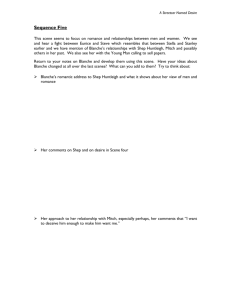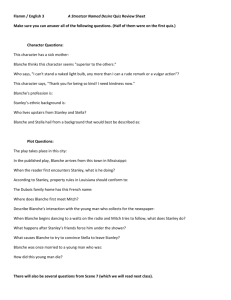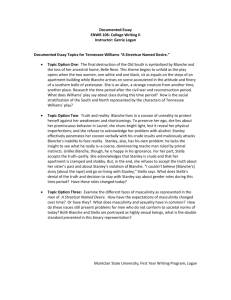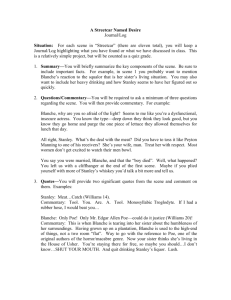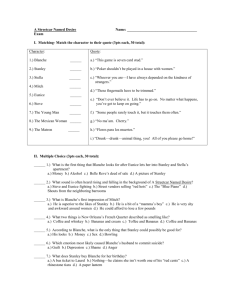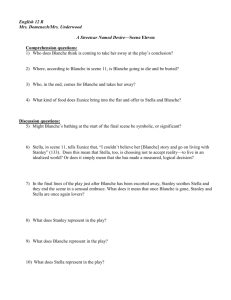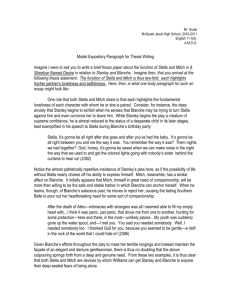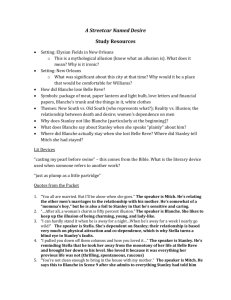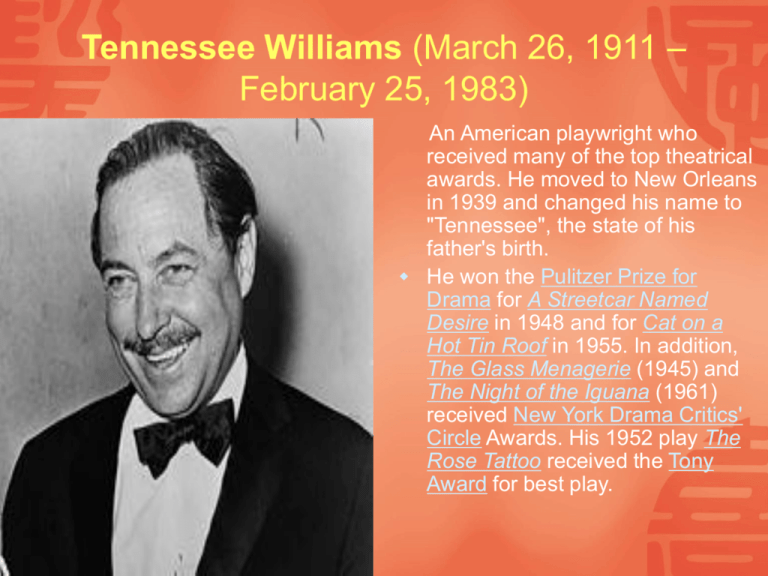
Tennessee Williams (March 26, 1911 –
February 25, 1983)
An American playwright who
received many of the top theatrical
awards. He moved to New Orleans
in 1939 and changed his name to
"Tennessee", the state of his
father's birth.
He won the Pulitzer Prize for
Drama for A Streetcar Named
Desire in 1948 and for Cat on a
Hot Tin Roof in 1955. In addition,
The Glass Menagerie (1945) and
The Night of the Iguana (1961)
received New York Drama Critics'
Circle Awards. His 1952 play The
Rose Tattoo received the Tony
Award for best play.
Life and creation
American Blues (1939)
Battle of Angels (1940)
The Glass Menagerie (1944)
27 Wagons Full of Cotton (1947)
A Streetcar Named Desire (1947)
Summer and Smoke (1948)
The Eccentricities of a Nightingale (1946)
Cat on a Hot Tin Roof (1955, Pulitzer Prize)
Play features of Tennessee
1. his plays are not naturalistic. The determinisms
which his characters resist are not primarily the
produce of physical environment or heredity. They are
built into the structure of existence.
2. theatrically, he set himself to dissolve the surface of
naturalism whose propositions he denied.
3. for the most part of his life Tennessee Williams
chose to dramatize himself as an alienated romantic.
4. for Williams, the social world– the world of power,
authority, history, time is perceived only indefinitely.
Writing style
The power of transmitting his ideas trough his
characters.
“He puts his words into the mouths of an
essentially imaginative people who speak in the
rhythms and colorful imagery of a region favorable
to poetry”.
Most of the characters in Williams’ plays are
autobiographical because they represent himself
or a member of his family. We can see this in the
following plays: “A Streetcar Named Desire,” “The
Glass Menagerie,” and “A Rose Tattoo”.
type of work · Play
genre · Tragedy
language · English
time and place written · Late 1940s, New Orleans
date of first publication · 1947
publisher · New Directions
tone · Ironic and sympathetic realism
setting (time) · 1940s
setting (place) · New Orleans, Louisiana
protagonist · Blanche DuBois
major conflict ·
Blanche DuBois, an aging Southern debutante富家女
子, arrives at her sister‘s home in New Orleans hoping
to start a new life after losing her ancestral mansion,
her job, and her reputation in her hometown of Laurel,
Mississippi. Blanche’s brother-in-law, a macho
working-class guy named Stanley Kowalski, is so filled
with class resentment 愤恨 that he seeks to destroy
Blanche's character in New Orleans as well. His
cruelty, combined with Blanche's fragile, insecure
personality, leaves her mentally detached from reality
by the play's end.
Plot
rising action · Blanche immediately rouses the
suspicion of Stanley, who (wrongly) suspects Blanche
of swindling 诈骗Stella out of her inheritance. Blanche
grows to despise 鄙视Stanley when she sees him
drunkenly beat her pregnant sister. Stanley
permanently despises Blanche after he overhears her
trying to convince Stella to leave Stanley because he
is common. Already suspicious of Blanche's act of
superiority, Stanley researches Blanche's past. He
discovers that in Laurel Blanche was known for her
sexual promiscuity and for having an affair with a
teenage student. He reports his findings to Blanche's
suitor, Mitch, dissuading Mitch from marrying
Blanche.
climax · After Stanley treats Blanche cruelly
during her birthday dinner, giving her a bus
ticket back to Laurel as a present, Stella goes
into labor. She and Stanley depart for the
hospital, leaving Blanche alone in the house.
Mitch arrives, drunk, and breaks off his
relationship with Blanche. Blanche, alone in the
apartment once more, drowns herself in alcohol
and dreams of an impossible rescue. Stanley
returns to the apartment from the hospital and
rapes Blanche.
falling action · Weeks after the rape, Stella
secretly prepares for Blanche‘s departure to an
insane asylum避难,庇护. She tells her neighbor
Eunice that she simply couldn’t believe
Blanche‘s accusation that Stanley raped her.
Unaware of reality, Blanche boasts that she is
leaving to join a millionaire suitor求婚. When
the doctor arrives, Blanche leaves after a minor
struggle, and only Stella and Mitch, who sits in
the kitchen with Stanley’s poker players, seem
to express real remorse遗憾 for her.
themes · Fantasy‘s 幻想 inability to overcome
reality; the relationship between sex and death;
dependence on men
motifs · Light; bathing; drunkenness
symbols · Shadows and cries; the Varsouviana
polka波尔卡舞曲; “It's Only a Paper Moon”; meat
Analysis of Major Characters
Blanche DuBois
When the play begins, Blanche is already a fallen
woman in society‘s eyes. Her family fortune and estate
are gone, she lost her young husband to suicide years
earlier, and she is a social pariah被社会遗弃者 due to
her indiscrete不慎重的 sexual behavior. She also has
a bad drinking problem, which she covers up poorly.
Behind her veneer虚假的外表 of social snobbery and
sexual propriety, Blanche is an insecure, dislocated
individual. She is an aging Southern belle who lives in
a state of perpetual panic about her fading beauty. Her
manner is dainty 文雅的 and frail 瘦弱的,易碎的, and
she sports a wardrobe of showy but cheap evening
clothes. Stanley quickly sees through Blanche's act
and seeks out information about her past.
In the Kowalski household, Blanche pretends to be a
woman who has never known indignity侮辱. Her false
propriety is not simply snobbery持势利态度的,
however; it constitutes a calculated attempt to make
herself appear attractive to new male suitors. Blanche
depends on male sexual admiration for her sense of
self-esteem, which means that she has often
succumbed to passion. By marrying, Blanche hopes to
escape poverty and the bad reputation that haunts her.
But because the chivalric Southern gentleman savior
and caretaker (represented by Shep Huntleigh) she
hopes will rescue her is extinct, Blanche is left with no
realistic possibility of future happiness. As Blanche
sees it, Mitch is her only chance for contentment, even
though he is far from her ideal.
Blanche:
Stanley‘s relentless persecution迫害 of Blanche foils
her pursuit of Mitch as well as her attempts to shield
herself from the harsh truth of her situation. The play
chronicles the subsequent crumbling破碎,坍塌 of
Blanche’s self-image and sanity理智. Stanley himself
takes the final stabs at Blanche, destroying the
remainder of her sexual and mental esteem by raping
her and then committing her to an insane asylum. In
the end, Blanche blindly allows herself to be led away
by a kind doctor, ignoring her sister's cries. This final
image is the sad culmination of Blanche's vanity and
total dependence upon men for happiness.
Stanley Kowalski
Audience members may well see Stanley as an
egalitarian平等主义的 hero at the play‘s start. He is
loyal to his friends and passionate to his wife. Stanley
possesses an animalistic physical vigor that is evident
in his love of work, of fighting, and of sex. His family is
from Poland, and several times he expresses his
outrage at being called “Polack” and other derogatory
贬低的 names. When Blanche calls him a “Polack,” he
makes her look old-fashioned and ignorant by
asserting that he was born in America, is an American,
and can only be called “Polish.” Stanley represents the
new, heterogeneous America to which Blanche
doesn't belong, because she is a relic from a defunct
social hierarchy. He sees himself as a social leveler,
as he tells Stella in Scene Eight.
Stanley's intense hatred of Blanche is
motivated in part by the aristocratic past
Blanche represents. He also (rightly) sees her
as untrustworthy and does not appreciate the
way she attempts to fool him and his friends
into thinking she is better than they are.
Stanley's animosity toward Blanche manifests
itself in all of his actions toward her—his
investigations of her past, his birthday gift to her,
his sabotage of her relationship with Mitch.
In the end, Stanley's down-to-earth character
proves harmfully crude and brutish. His chief
amusements are gambling, bowling, sex, and
drinking, and he lacks ideals and imagination. His
disturbing, degenerate nature, first hinted at when
he beats his wife, is fully evident after he rapes his
sister-in-law. Stanley shows no remorse for his
brutal actions. The play ends with an image of
Stanley as the ideal family man, comforting his
wife as she holds their newborn child. The
wrongfulness of this representation, given what we
have learned about him in the play, ironically calls
into question society's decision to ostracize
Blanche.
Stanley Kowalski
Stanley's intense hatred of Blanche is
motivated in part by the aristocratic past
Blanche represents. He also (rightly) sees her
as untrustworthy and does not appreciate the
way she attempts to fool him and his friends
into thinking she is better than they are.
Stanley's animosity toward Blanche manifests
itself in all of his actions toward her—his
investigations of her past, his birthday gift to her,
his sabotage of her relationship with Mitch.
In the end, Stanley's down-to-earth character proves
harmfully crude and brutish. His chief
amusements are gambling, bowling, sex, and
drinking, and he lacks ideals and imagination. His
disturbing, degenerate nature, first hinted at when
he beats his wife, is fully evident after he rapes his
sister-in-law. Stanley shows no remorse for his
brutal actions. The play ends with an image of
Stanley as the ideal family man, comforting his
wife as she holds their newborn child. The
wrongfulness of this representation, given what we
have learned about him in the play, ironically calls
into question society's decision to ostracize
Blanche.
Harold “Mitch” Mitchell
Perhaps because he lives with his dying mother,
Mitch is noticeably more sensitive than
Stanley's other poker friends. The other men
pick on him for being a mama's boy. Even in his
first, brief line in Scene One, Mitch's
gentlemanly behavior stands out. Mitch appears
to be a kind, decent human being who, we learn
in Scene Six, hopes to marry so that he will
have a woman to bring home to his dying
mother.
Mitch doesn't fit the bill of the chivalric hero of
whom Blanche dreams. He is clumsy, sweaty,
and has unrefined interests like muscle building.
Though sensitive, he lacks Blanche's romantic
perspective and spirituality, as well as her
understanding of poetry and literature. She toys
with his lack of intelligence—for example, when
she teases him in French because she knows
he won't understand—duping him into playing
along with her self-flattering charades.
Though they come from completely different worlds,
Mitch and Blanche are drawn together by their mutual
need of companionship and support, and they
therefore believe themselves right for one another.
They also discover that they have both experienced
the death of a loved one. The snare in their
relationship is sexual. As part of her prim-and-proper
act, Blanche repeatedly rejects Mitch's physical
affections, refusing to sleep with him. Once he
discovers the truth about Blanche's sordid sexual past,
Mitch is both angry and embarrassed about the way
Blanche has treated him. When he arrives to chastise
her, he states that he feels he deserves to have sex
with her, even though he no longer respects her
enough to think her fit to be his wife.
The difference in Stanley's and Mitch's
treatment of Blanche at the play's end
underscores Mitch's fundamental
gentlemanliness. Though he desires and makes
clear that he wants to sleep with Blanche, Mitch
does not rape her and leaves when she cries
out. Also, the tears Mitch sheds after Blanche
struggles to escape the fate Stanley has
arranged for her show that he genuinely cares
for her. In fact, Mitch is the only person other
than Stella who seems to understand the
tragedy of Blanche's madness.
Themes
Themes are the fundamental and often universal ideas
explored in a literary work.
Fantasy's Inability to Overcome Reality
Although Williams's protagonist in A Streetcar Named
Desire is the romantic Blanche DuBois, the play is a
work of social realism. Blanche explains to Mitch that
she fibs because she refuses to accept the hand fate
has dealt her. Lying to herself and to others allows her
to make life appear as it should be rather than as it is.
Stanley, a practical man firmly grounded in the
physical world, disdains Blanche's fabrications and
does everything he can to unravel them.
The antagonistic relationship between
Blanche and Stanley is a struggle between
appearances and reality. It propels the
play's plot and creates an overarching
tension. Ultimately, Blanche's attempts to
remake her own and Stella's existences—to
rejuvenate her life and to save Stella from a
life with Stanley—fail.
The Relationship between Sex and Death
Blanche's fear of death manifests itself in her
fears of aging and of lost beauty. She refuses to
tell anyone her true age or to appear in harsh
light that will reveal her faded looks. She seems
to believe that by continually asserting her
sexuality, especially toward men younger than
herself, she will be able to avoid death and
return to the world of teenage bliss she
experienced before her husband's suicide.
Dependence on Men
A Streetcar Named Desire presents a sharp
critique of the way the institutions and attitudes
of postwar America placed restrictions on
women's lives. Williams uses Blanche's and
Stella's dependence on men to expose and
critique the treatment of women during the
transition from the old to the new South. Both
Blanche and Stella see male companions as
their only means to achieve happiness, and
they depend on men for both their sustenance
and their self-image.
Blanche recognizes that Stella could be
happier without her physically abusive
husband, Stanley. Yet, the alternative
Blanche proposes—contacting Shep
Huntleigh for financial support—still involves
complete dependence on men. When Stella
chooses to remain with Stanley, she
chooses to rely on, love, and believe in a
man instead of her sister. Williams does not
necessarily criticize Stella—he makes it
quite clear that Stanley represents a much
more secure future than Blanche does.
Motifs
Motifs are recurring structures, contrasts, or literary
devices that can help to develop and inform the text's
major themes.
Light
Throughout the play, Blanche avoids appearing in
direct, bright light, especially in front of her suitor,
Mitch. She also refuses to reveal her age, and it is
clear that she avoids light in order to prevent him from
seeing the reality of her fading beauty. In general, light
also symbolizes the reality of Blanche's past. She is
haunted by the ghosts of what she has lost—her first
love, her purpose in life, her dignity, and the genteel
society (real or imagined) of her ancestors.
Blanche covers the exposed lightbulb in the Kowalski
apartment with a Chinese paper lantern, and she
refuses to go on dates with Mitch during the daytime
or to well-lit locations. Mitch points out Blanche's
avoidance of light in Scene Nine, when he confronts
her with the stories Stanley has told him of her past.
Mitch then forces Blanche to stand under the direct
light. When he tells her that he doesn't mind her age,
just her deceitfulness, Blanche responds by saying
that she doesn't mean any harm. She believes that
magic, rather than reality, represents life as it ought to
be. Blanche's inability to tolerate light means that her
grasp on reality is also nearing its end.
In Scene Six, Blanche tells Mitch that being in
love with her husband, Allan Grey, was like
having the world revealed in bright, vivid light.
Since Allan's suicide, Blanche says, the bright
light has been missing. Through all of Blanche's
inconsequential sexual affairs with other men,
she has experienced only dim light. Bright light,
therefore, represents Blanche's youthful sexual
innocence, while poor light represents her
sexual maturity and disillusionment
Bathing
Throughout A Streetcar Named Desire, Blanche bathes
herself. Her sexual experiences have made her a
hysterical woman, but these baths, as she says, calm
her nerves. In light of her efforts to forget and shed her
illicit past in the new community of New Orleans, these
baths represent her efforts to cleanse herself of her
odious history. Yet, just as she cannot erase the past,
her bathing is never done. Stanley also turns to water
to undo a misdeed when he showers after beating
Stella. The shower serves to soothe his violent temper;
afterward, he leaves the bathroom feeling remorseful
and calls out longingly for his wife.
Drunkenness
Both Stanley and Blanche drink excessively at various
points during the play. Stanley's drinking is social: he
drinks with his friends at the bar, during their poker
games, and to celebrate the birth of his child.
Blanche's drinking, on the other hand, is anti-social,
and she tries to keep it a secret. She drinks on the sly
in order to withdraw from harsh reality. A state of
drunken stupor enables her to take a flight of
imagination, such as concocting a getaway with Shep
Huntleigh. For both characters, drinking leads to
destructive behavior: Stanley commits domestic
violence, and Blanche deludes herself. Yet Stanley is
able to rebound from his drunken escapades, whereas
alcohol augments Blanche's gradual departure from
sanity.
Symbols
Symbols are objects, characters, figures, or colors
used to represent abstract ideas or concepts.
Shadows and Cries
As Blanche and Stanley begin to quarrel in Scene Ten,
various oddly shaped shadows begin to appear on the
wall behind her. Discordant noises and jungle cries
also occur as Blanche begins to descend into
madness. All of these effects combine to dramatize
Blanche's final breakdown and departure from reality
in the face of Stanley's physical threat. When she
loses her sanity in her final struggle against Stanley,
Blanche retreats entirely into her own world. Whereas
she originally colors her perception of reality according
to her wishes, at this point in the play she ignores
reality altogether.
The Varsouviana Polka
The Varsouviana is the polka tune to which Blanche and her
young husband, Allen Grey, were dancing when she last saw
him alive. Earlier that day, she had walked in on him in bed with
an older male friend. The three of them then went out dancing
together, pretending that nothing had happened. In the middle
of the Varsouviana, Blanche turned to Allen and told him that he
“disgusted” her. He ran away and shot himself in the head.
The polka music plays at various points in A Streetcar Named
Desire, when Blanche is feeling remorse for Allen's death. The
first time we hear it is in Scene One, when Stanley meets
Blanche and asks her about her husband. Its second
appearance occurs when Blanche tells Mitch the story of Allen
Grey. From this point on, the polka plays increasingly often, and
it always drives Blanche to distraction. She tells Mitch that it
ends only after she hears the sound of a gunshot in her head.
The polka music plays at various points in A Streetcar
Named Desire, when Blanche is feeling remorse for
Allen's death. The first time we hear it is in Scene One,
when Stanley meets Blanche and asks her about her
husband. Its second appearance occurs when
Blanche tells Mitch the story of Allen Grey. From this
point on, the polka plays increasingly often, and it
always drives Blanche to distraction. She tells Mitch
that it ends only after she hears the sound of a
gunshot in her head.
The polka and the moment it evokes represent
Blanche's loss of innocence. The suicide of the young
husband Blanche loved dearly was the event that
triggered her mental decline. Since then, Blanche
hears the Varsouviana whenever she panics and loses
her grip on reality.
“It's Only a Paper Moon”
In Scene Seven, Blanche sings this popular ballad while she
bathes. The song's lyrics describe the way love turns the world
into a “phony” fantasy. The speaker in the song says that if both
lovers believe in their imagined reality, then it's no longer
“make-believe.” These lyrics sum up Blanche's approach to life.
She believes that her fibbing is only her means of enjoying a
better way of life and is therefore essentially harmless.
As Blanche sits in the tub singing “It's Only a Paper Moon,”
Stanley tells Stella the details of Blanche's sexually corrupt past.
Williams ironically juxtaposes Blanche's fantastical
understanding of herself with Stanley's description of Blanche's
real nature. In reality, Blanche is a sham who feigns propriety
and sexual modesty. Once Mitch learns the truth about Blanche,
he can no longer believe in Blanche's tricks and lies.
Meat
In Scene One, Stanley throws a package of
meat at his adoring Stella for her to catch. The
action sends Eunice and the Negro woman into
peals of laughter. Presumably, they've picked
up on the sexual innuendo behind Stanley's
gesture. In hurling the meat at Stella, Stanley
states the sexual proprietorship he holds over
her. Stella's delight in catching Stanley's meat
signifies her sexual infatuation with him.
Scene One
They told me to take a street-car named Desire, and transfer to
one called Cemeteries, and ride six blocks and get off at—
Elysian Fields!
Summary
The setting is the exterior of a corner building on a street called
Elysian Fields, which runs between the river and the train tracks
in a poor section of New Orleans that has “raffish [crude]
charm.” Faded white stairs lead up to the entrances of the
shabby building's two flats. Steve and Eunice live upstairs, and
Stanley and Stella live downstairs. The hum of voices in the
street can be heard, as well as the bluesy notes of a cheap
piano playing in a bar around the corner. (Williams notes that
the music from this piano is to set the mood throughout the
play.) It is an early May evening, and the sky at dusk is almost
turquoise.
Analysis
The play offers a romanticized vision of slum life that
nevertheless reflects the atypical characteristics of New
Orleans. The mix of characters and social elements around
Elysian Fields demonstrates the way New Orleans has
historically differed from other American cities in the South. It
was originally a Catholic settlement (unlike most Southern cities,
which were Protestant), and consequently typical Southern
social distinctions were ignored. Hence, blacks mingle with
whites, and members of different ethnic groups play poker and
bowl together. Stanley, the son of Polish immigrants, represents
the changing face of America. Williams's romanticizing is more
evident in his portrayal of New Orleans as a city where upperclass people marry members of the lower class, fights get ugly
but are forgotten the next day, and the perpetual bluesy notes
of an old piano take the sting out of poverty.
The play immediately establishes Stanley and
Blanche as polar opposites, with Stella as the
link between them. Stage directions describe
Stanley as a virulent character whose chief
pleasure is women. His dismissal of Blanche's
beauty is therefore significant, because it shows
that she does not exude his same brand of
carnal desire. On the other hand, Blanche's
delicate manners and sense of propriety are
offended by Stanley's brutish virility. Stanley's
qualities—variously described as vitality,
heartiness, brutality, primitivism, lust for life,
animality—lead him over the course of the play
into an unrelenting, unthinking assault on the
already crumbling facade of Blanche's world.
Blanche comes across as a frivolous, hysterical,
insensitive, and self-obsessed individual as she
derides her sister's lesser social status and doesn't
express joy at seeing Stella so in love. Blanche, who
arrives in New Orleans having lost Belle Reve and
having been forced to leave her job, exudes
vulnerability and emotional frailty. Stanley's cocky
interactions with Blanche show him to be insensitive—
he barely lets Blanche get a word in edgewise as he
quickly assesses her beauty. Nevertheless, in this
introduction, the audience is likely to sympathize with
Stanley rather than Blanche, for Blanche behaves
superficially and haughtily, while Stanley comes
across as unpretentious, a social being with a zest for
life.
Stanley's entrance with a package of meat
underscores his primitive qualities. It is as if he
were bringing it back to his cave fresh from the
kill. His entrance also underscores the intense
sexual bond between him and Stella, which is
apparent to the other characters as well.
Stanley yells “Catch!” as he tosses the package,
and a moment later the Negro woman yells
“Catch what!” Eunice and the Negro woman
see something sexual, and scandalously
hilarious, in Stanley's act of tossing the meat to
a breathlessly delighted Stella.
The name of the Kowalskis' street underscores
the extreme, opposing archetypes that Stanley
and Blanche represent. Elysian Fields is the
name for the ancient Greek version of the
afterlife. Stanley, the primitive, pagan reveler
who is in touch with his vital core, is at home in
the Elysian Fields, but the Kowalskis' home and
neighborhood clearly are not Blanche's idea of
heaven. Blanche represents a society that has
become too detached from its animal element.
She is distinctly overcivilized and has repressed
her vitality and her sexuality. Blanche's health
and her sanity are waning as a result.

